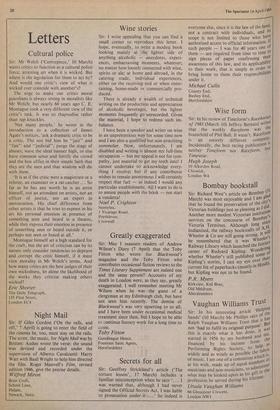Letters
Cultural police
Sir: Mr Welch ('Centrepiece,' 10 March) wants critics to function as a cultural police force, arresting art when it is wicked. But where is the legislation for them to act by? And would one critic's view of what is wicked ever coincide with another's?
The urge to make our critics moral guardians is always strong in moralists like Mr Welch; but nearly 60 years ago C. E. Montague took a very different view of the critic's task. It was to rhapsodise rather than rap knuckles.
`Not many people,' he wrote in the introduction to a collection of James Agate's notices, 'ask a dramatic critic to be a critic. The rest bid him be "just" and "fair" and "judicial"; purge the stage of abuses; wave the ideal banner high, or else have common sense and fortify the crowd and the box office in their simple faith that they are the men and that wisdom will die with them.
'It is as if the critic were a magistrate or a referee, an examiner or a rat-catcher... So far as he has any worth he is an artist himself, not an attendant on artists, nor an officer of justice, nor an expert in mensuration. His chief difference from other artists is that he tries to express in his art his personal emotion in presence of something seen and heard in a theatre, while they express their emotion in presence of something seen or heard outside it, or perhaps not seen or heard at all.'
Montague himself set a high standard for the craft, but the art of criticism can by its nature only consider tendencies to deprave and corrupt the critic himself, if it must view morality in Mr Welch's terms. And how many critics are the best judges of their own wickedness, let alone the likelihood of the works they criticise making others wicked?
Eric Shorter
The Daily Telegraph, 135 Fleet Sired, London EC4










































 Previous page
Previous page